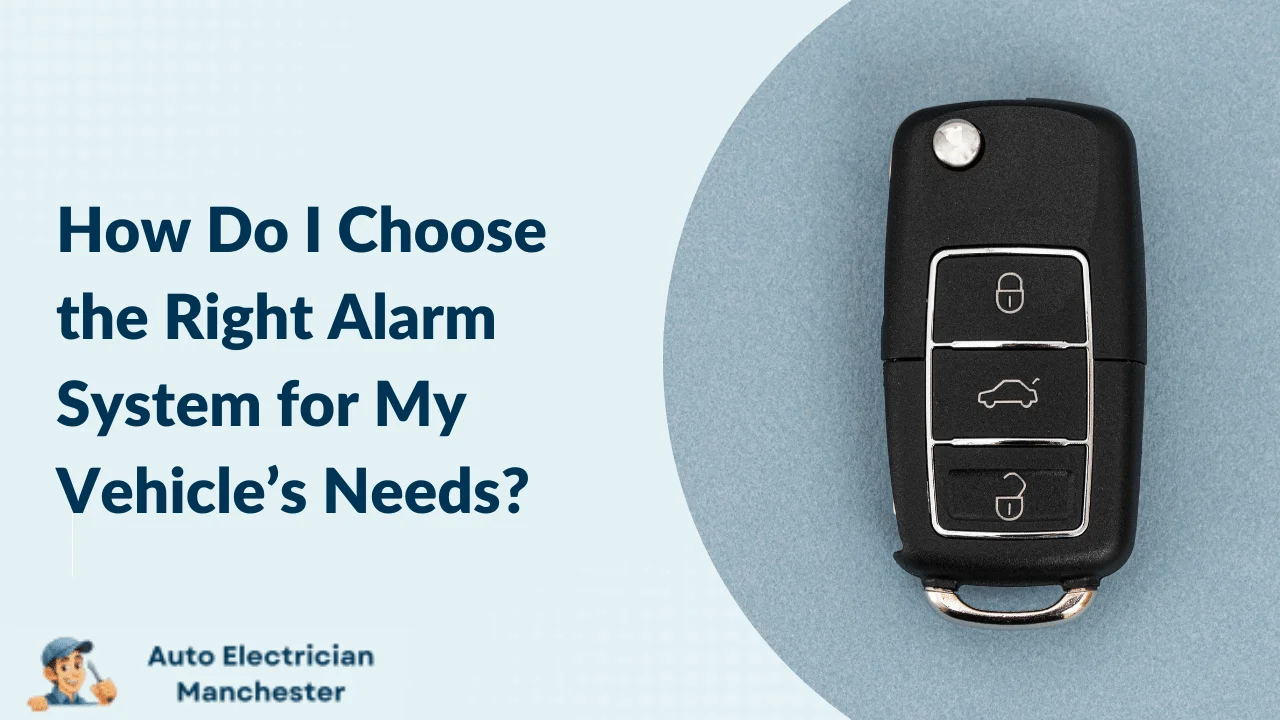
Car alarms aren’t one-size-fits-all. Protecting your prized possession requires a customized approach. This comprehensive guide empowers you to make an informed decision, ensuring your car is secured against theft attempts.
Understanding Your Security Needs
Before diving into specific features, take a moment to assess your individual requirements. Here are key factors to consider:
Risk Level: Where you park your car significantly impacts the choice of alarm system. High-risk areas with poor lighting or frequent break-ins demand a more robust system with features like remote notification and GPS tracking. Conversely, a well-lit garage might be suitable for a more basic alarm.
Car Value: The value of your vehicle influences the level of security investment. A classic car might benefit from a basic alarm with features like shock and glass-break sensors. On the other hand, a high-end luxury car warrants a more advanced system with GPS tracking, starter disable, and two-way communication for ultimate peace of mind.
Desired Features: Consider the functionalities that best suit your lifestyle. Shock sensors detect bumps or movement, deterring potential thieves attempting to break in or steal wheels. Glass-break sensors offer an extra layer of security, identifying break-ins through the sound of shattering glass. Remote start allows you to pre-heat or cool your car for added comfort and convenience, especially during extreme temperatures.
Demystifying Car Alarm System Types
With a clearer picture of your needs, delve into the different car alarm system types:
One-Way vs. Two-Way Alarms: One-way alarms sound the siren on your car in case of a break-in attempt, but they don’t provide feedback to you. Two-way systems send signals to your remote, informing you of the alarm’s status through flashing lights, sound, or even a text message to your smartphone (depending on the system). This allows for a quicker response and potentially deters thieves if they realize the car is actively monitored.
Additional Considerations for a Secure Choice
Beyond the basic types, consider these crucial factors for a foolproof security system:
Compatibility: Ensure the alarm system is compatible with your car’s make and model for proper function. Consult a professional installer or the alarm system manufacturer’s website for a compatibility check.
Installation: While some basic alarms might seem DIY-friendly, professional installation by a qualified technician guarantees optimal performance. Improper wiring can lead to electrical issues and even compromise your car’s security system.
Range: Standard car alarm remotes have a limited range. If you frequently park far away from your car, consider long-range options that ensure you receive alerts even from a distance.
Choosing the Right Features for Your Car Alarm System
Having identified your security needs and explored the different alarm system types, it’s time to delve into the specific features that can enhance your car’s protection. Here’s a breakdown of some key functionalities to consider:
Sensors:
Shock Sensor: Detects bumps, vibrations, or tilts in your car, potentially caused by someone trying to break in or steal wheels.
Glass-Break Sensor: Identifies the distinctive sound of shattering glass, providing an extra layer of security against break-ins.
Perimeter Sensor: Creates an invisible electronic field around your car. If the field is breached by someone entering the vehicle, the alarm triggers.
Entry & Ignition Protection:
Door Pin Switch: Detects unauthorized opening of the car doors.
Trunk Release Sensor: Triggers the alarm if someone attempts to tamper with the trunk.
Ignition Control Module: Prevents the car from starting if the wrong key is used, offering an additional layer of theft protection.
Remote Features:
Two-Way Communication: Allows for real-time communication between the car alarm system and your remote or smartphone app. You receive alerts if the alarm is triggered, enabling a quicker response.
Remote Start: Lets you start your car remotely, allowing you to pre-heat or cool the vehicle for added comfort and convenience, especially in extreme weather conditions.
Smartphone Integration: Certain advanced car alarm systems integrate with smartphone apps. This allows for remote monitoring, lock/unlock functions, and even GPS tracking in case of theft.
Advanced Features for Enhanced Security
For those seeking the ultimate protection, car alarm systems offer a range of advanced features:
GPS Tracking: Incorporates a GPS module that allows you to track your car’s location in real-time through a smartphone app or web interface. This proves invaluable in case of theft, aiding recovery efforts.
Remote Window Control: Provides remote control over your car’s windows, allowing you to roll them up or down from a distance. This can be a helpful feature, especially if you forget to close a window before parking.
Tilt Sensor: Detects changes in the car’s angle, which can indicate attempts to tow the vehicle without authorization.
Voice Control: Allows for hands-free interaction with your car’s alarm system using voice commands.
Final Words
By prioritizing your needs, understanding the available features, and considering the additional factors, you’re well on your way to selecting the perfect car alarm system. Remember, a well-chosen car alarm system is an investment in the safety and security of your vehicle, offering peace of mind and safeguarding your prized possession.
FAQ
Can I install a car alarm myself?
While some basic models might be advertised for self-installation, it’s generally recommended to seek professional help. A qualified technician can ensure proper installation, avoiding potential electrical problems and maximizing the effectiveness of your security system.

David Mack is a seasoned writer with a passion for the auto electrician niche. With years of hands-on experience and a knack for demystifying complex topics, David brings practical insights to his readers. Whether you’re a professional or a car enthusiast, his engaging articles offer valuable tips and trends in auto electrical systems.
